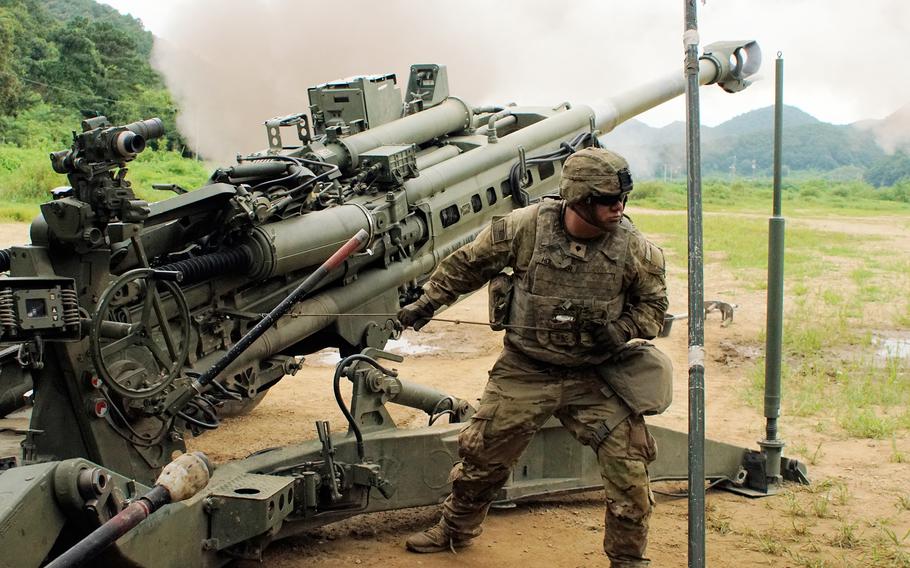
U.S. artillerymen fire an M77A2 Howitzer during Ulchi Freedom Shield training in Paju, South Korea, Aug. 16, 2023. (Nancy Gomez/U.S. Army)
CAMP HUMPHREYS, South Korea — The United States and South Korea will kick off their second large-scale military exercise of the year next week with specific North Korean threats in mind.
The 11-day Ulchi Freedom Shield exercise will begin Aug. 19 throughout the South and focus on “realistic threats” from North Korea, such as weapons of mass destruction, cyber-attacks and GPS jamming, the Joint Chiefs said in a news release Monday.
Roughly 19,000 South Korean troops will participate in the training, according to the Joint Chiefs.
U.S. Forces Korea — the command overseeing the roughly 28,500 American troops on the peninsula — does not disclose the number of U.S. forces involved in the semiannual exercise as a matter of policy, citing operational security concerns.
The training will include an unspecified number of personnel from U.S. and South Korean government agencies, USFK spokesman David Kim said by email Monday.
Ulchi Freedom Shield is the second large-scale military training held annually by the U.S. and South Korea. Freedom Shield, also 11 days long, was carried out in March and consisted of 48 separate drills.
The exercises are named after Eulji Mundeok, a Korean general who led his troops against Chinese forces in the 7th century.
Pyongyang routinely criticizes large-scale military exercises between Washington and Seoul, describing them as a rehearsal of an invasion.
During last year’s Ulchi Freedom Shield, North Korea said the drills could prompt an “unprecedented large-scale thermonuclear war” on the peninsula, according to a state-run Korean Central News Agency report on Aug. 22.
Two days after that report, the North launched a spy satellite that failed to reach orbit and fired two short-range ballistic missiles off its eastern coast six days after that.
North Korea’s satellite and ballistic missile tests were major factors for the South’s decision to withdraw from a deconfliction agreement that banned artillery drills and military flights near the border, according to the South.
South Korean President Yoon Suk Yeol pulled Seoul away from the five-year agreement with Pyongyang on June 4 and resumed artillery drills that were previously banned on July 3.
News of Ulchi Freedom Shield’s start comes just days after North Korea sent a fresh wave of trash-carrying balloons into the South; roughly 240 North Korean balloons were tracked in the air on Saturday, according to the South’s military.
Pyongyang began floating thousands of balloons carrying trash and manure to the South in May in retaliation of South Korean activists who sent balloons carrying humanitarian aid and pro-South Korean propaganda leaflets northward, according to KCNA.
One of those balloons landed near an elementary school at Osan Air Base on June 2 and another fell within Yongsan Garrison on July 24.